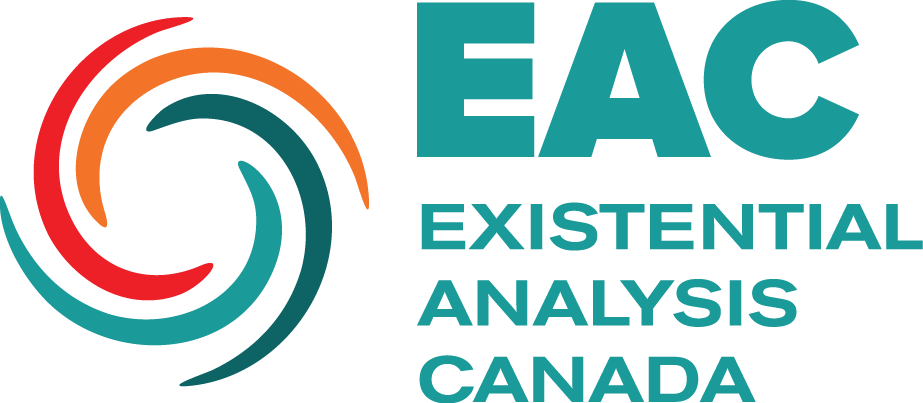TRAINING DETAILS
Certificate & Diploma Requirements
These 3 levels are part-time, with a maximum of 20 training days per year. They are designed to be managed alongside current occupations and/or other training (people-helping professions or studies in counselling and/or psychology).
Overview
One individual admissions interview
Two admission days at the start of the Basic Certificate (included in the 44-54 days of training)
Self-experience in individual sessions
Supervision
Exams
Practical work: practicum hours (can be completed as part of other training programs or in
private practice (not required for basic certificate)A written theoretical or practical paper or project (not required for basic certificate)
In Detail
EA CERTIFICATE AND DIPLOMA REQUIREMENTS
Subject to adjustment
THREE LEVELS of EA TRAINING:
Basic Certificate
in Existential Analysis and Logotherapy
44 to 54 seminar days • 2 1⁄2 to 3 years
EXAMS
2 hour written exam with 20 questions after the first year of training as well as at the end of basic training (or five 8 question mini exams at the end of each section)
*SELF-EXPERIENCE
Minimum 15 hours individually with therapist - minimum 10 of these hours with EA therapist (for other therapists, 2 hours count as 1 hour)
Maximum 5 hours in EA small groups (3 hours count as 1 hour, hence maximum 15
hours in EA small groups)
*SUPERVISION
Basic Certificate in EA and LT - not a requirement
PRACTICAL WORK
not a requirement
CASE PRESENTATIONS
not a requirement
*PAPER
not a requirement
PROFESSIONAL DEVELOPMENT (PD):
not a requirement
Counselling Diploma
in Existential Analysis and Logotherapy
7 additional clinical seminar days
Plus 4 PD days (special seminars/congresses)
3 to 3 1⁄2 years (includes supervision)
EXAMS
An additional 4 hour written exam with 10 theoretical questions and a treatment proposal for 4 cases at the end of 7 days clinical training
*SELF-EXPERIENCE
Minimum 20 hours individually with therapist – minimum 10 of these hours with EA therapist (for other therapists, 2 hours count as 1 hour)
Maximum 10 hours in EA small groups (3 hours count as 1 hour, hence maximum
30 hours in EA small groups)
*SUPERVISION
100 hours
Minimum 50 hours with EA therapist or in EA seminars
Remaining hours can come from outside supervision
Maximum 33 hours can be done during counselling diploma training - Remaining 67 hours to be done afterwards
PRACTICAL WORK
200 hours
CASE PRESENTATIONS
5 cases
2 general counselling situations (supervised once)
1 crisis situation (supervised 1-3 times)
2 longer counselling situations of more than 3 counselling sessions with the same
client (supervised 1-3 times)
*PAPER
20 pages
PROFESSIONAL DEVELOPMENT (PD)
minimum 4 days of special seminars and/or EA congresses
Psychotherapy Diploma
in Existential Analysis
36 to 46 additional seminar days
Plus 7 PD days (special seminars/congresses)
5-7 years (includes supervision) for completion of all requirements
EXAMS
An additional 4 hour written exam with 10 theoretical questions and a treatment proposal for 4 cases at the end of clinical training
*SELF-EXPERIENCE
Minimum 50 hours (usually 70-80 hours)
Minimum 32 hours individually with therapist - minimum 16 of these hours with EA therapist (for other therapists, 2 hours count as 1 hour)
Maximum 18 hours in EA small groups (3 hours count as 1 hour, hence maximum
54 hours in EA small groups)
*SUPERVISION
150 hours
Minimum 75 hours with EA therapist or in EA seminars
Remaining hours can come from outside supervision
Maximum 50 hours can be done during counselling diploma training
Remaining 100 hours to be done after psychotherapy diploma training begins
PRACTICAL WORK
550 hours supervised practicum or internship as part of a degree or other training program or supervised clinical work (approved by trainers); supervision of practicum - 30 hours; for those possessing a diploma or degree with 550 hours supervised practicum or internship prior to EA training, this requirement is considered to be fulfilled
600 hours own practical work seeing clients; supervision of practical work - 150 hours
The above required hours can be completed during EA training or after seminars have been completed
CASE PRESENTATIONS
5 cases presented a minimum of 5 times each (average 7 times) and a final supervision; if there are difficulties presenting long-term client cases, 3 long-term client cases may be replaced by:
a) 2 cases from medium-term clients (30-50 hours) supervised several times;
b) 2 cases from short-term clients (15-30 hours) supervised several times; additional case supervision5 thematic case presentations (supervised 1-2 times)
*PAPER
30 pages
PROFESSIONAL DEVELOPMENT (PD)
minimum 7 days of special seminars and/or EA congresses
*Formula for Requirements
Supervision Formula
EA seminar supervision: 1 hour counts as 1 hour (generally 8 hours for full day)
EA group supervision with EA therapist: 1 hour counts as 1 hour
Group supervision with EA therapist or other therapist: 2 hours count as 1 hour
EA peer group supervision: 3 hours counts as 1 hour
Individual supervision with EA therapist: 50 or 60 minutes session counts as 1 hour
Individual supervision with other therapist: 2 sessions of 50 or 60 minutes counts as 1 hour
Therapists not trained in EA are to have an existential or humanistic orientation
Self-Experience Formula
Individual self-experience with EA therapist: 1 hour counts as 1 hour
Individual self-experience with other therapist: 2 hours count as 1 hour
Group self-experience with EA small groups: 3 hours count as 1 hour
Therapists not trained in EA are to have an existential or humanistic orientation.
The approval of completion of individual self-experience is given by the EA therapist who has done most of the sessions.
Paper Formula
No page requirement for a published article in a scientific journal
Can also be a project (approved by trainers)
The paper can be on practical themes (example: case studies, application of methods, comparison with other therapeutic procedures, etc.) or theoretical questions (anthropological themes, philosophical themes, psychological themes, etc.) or it can be done as a literature work discussing for example, a book from Yalom
The paper must deal with EA contents and include EA literature
